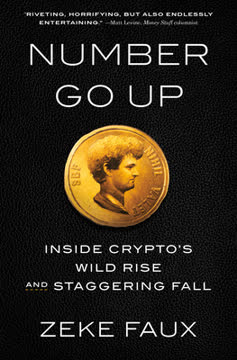Key Takeaways
1. Tether: The Unregulated Backbone of Crypto's Wild Ride
"Tether's claims that its virtual currency was fully backed by U.S. dollars at all times was a lie."
The crypto lifeline. Tether, a stablecoin supposedly backed 1:1 by US dollars, became the backbone of the cryptocurrency world. It allowed traders to move money quickly between exchanges and provided a seemingly stable store of value in the volatile crypto market.
Questionable backing. Despite claims of full dollar backing, Tether's reserves remained shrouded in mystery. The company resisted full audits and faced ongoing scrutiny from regulators and skeptics. Investigations revealed a complex web of offshore accounts, Chinese commercial paper, and risky investments.
Survival against odds. Despite numerous crises and revelations about its questionable practices, Tether continued to thrive. Its ability to weather storms that sank other crypto companies raised both admiration and suspicion within the industry. By 2023, Tether had become one of the most profitable companies in the world, with billions in profits from interest on its reserves.
2. From Plastic Surgery to Crypto: The Unlikely Rise of Giancarlo Devasini
"All my work seemed like a scam, the exploitation of a whim."
Unconventional background. Giancarlo Devasini's journey from plastic surgeon to crypto mogul is a testament to the wild nature of the cryptocurrency world. Disillusioned with the superficiality of cosmetic surgery, he pivoted to electronics importing before stumbling into the world of Bitcoin.
Bitfinex and Tether. Devasini became a key figure in the crypto world as the de facto head of Bitfinex, one of the largest cryptocurrency exchanges, and Tether, the dominant stablecoin. His business acumen and willingness to operate in regulatory gray areas allowed both companies to thrive despite numerous setbacks and controversies.
Secrecy and success. Devasini maintained a low profile, rarely giving interviews or appearing at public events. This air of mystery, combined with Tether's continued success in the face of skepticism, cemented his reputation as one of the most influential and enigmatic figures in the crypto world.
3. Sam Bankman-Fried: The Boy Genius Who Built and Crashed an Empire
"I fucked up. I think really what I want to say is, like, I'm really fucking sorry."
Meteoric rise. Sam Bankman-Fried (SBF) went from an unknown trader to a crypto billionaire in just a few years. His exchange, FTX, became one of the largest in the world, and he cultivated an image as the responsible face of crypto, advocating for regulation and philanthropy.
Effective altruism. SBF claimed to be motivated by effective altruism, a philosophy that advocates earning as much money as possible to donate to worthy causes. This narrative helped him gain trust and influence in both the crypto world and mainstream finance.
Spectacular fall. In November 2022, FTX collapsed spectacularly amid revelations of misused customer funds and fraudulent practices. SBF's empire crumbled, exposing the fragility of the crypto ecosystem and raising serious questions about the ethics and stability of the entire industry.
4. The Crypto Casino: Gambling, Scams, and the Illusion of Easy Money
"Number go up technology is a very powerful piece of technology. It's the price. As the price goes higher, more people become aware of it, and buy it in anticipation of the price continuing to climb."
Speculation frenzy. The cryptocurrency boom was driven largely by speculation and the promise of quick riches. Traders and investors poured money into a dizzying array of coins and tokens, often with little understanding of their underlying technology or purpose.
Pump and dump schemes. Many cryptocurrencies and NFT projects were little more than elaborate pump and dump schemes, where insiders would hype up a project, drive up the price, and then sell their holdings to unsuspecting buyers.
Real-world consequences. The crypto casino had real-world impacts, from individuals losing their life savings to entire economies being destabilized. The promise of easy money drew in people from all walks of life, often with devastating consequences.
5. NFTs: Digital Art or Elaborate Ponzi Scheme?
"I'm not going to lie. This was a lie."
NFT mania. Non-fungible tokens (NFTs) exploded in popularity, with digital artworks and collectibles selling for millions of dollars. The Bored Ape Yacht Club became one of the most prominent NFT collections, attracting celebrity buyers and spawning an entire ecosystem.
Questionable value. Many critics argued that NFTs were little more than a speculative bubble, with prices driven by hype and celebrity endorsements rather than intrinsic value. The ability to easily replicate digital images raised questions about what buyers were actually purchasing.
Cultural impact. Despite skepticism, NFTs had a significant impact on the art world and popular culture. They sparked debates about the nature of ownership in the digital age and opened up new avenues for artists and creators to monetize their work.
6. Axie Infinity: The Play-to-Earn Dream That Turned Into a Nightmare
"It felt to me like I was watching my own house burn down or something."
Play-to-earn phenomenon. Axie Infinity, a blockchain-based game, became a sensation in the Philippines and other developing countries. Players could earn cryptocurrency by playing the game, with some claiming to make more than traditional jobs.
Economic impact. The game's popularity had real-world economic effects, with some players able to buy homes or pay for education with their earnings. However, the model relied on a constant influx of new players to sustain the economy.
Collapse and consequences. When the game's economy collapsed, many players lost significant amounts of money. The Axie Infinity story highlighted the risks of crypto-based economic models and the potential for exploitation of vulnerable populations.
7. El Salvador's Bitcoin Experiment: A Cautionary Tale for Crypto Adoption
"No Acceptamos Bitcoin"
Bold national strategy. In 2021, El Salvador became the first country to adopt Bitcoin as legal tender, spearheaded by President Nayib Bukele. The move was hailed by crypto enthusiasts as a major step towards mainstream adoption.
Implementation challenges. The rollout faced numerous technical and practical challenges. Many Salvadorans struggled to use the government-backed Bitcoin wallet, and businesses were reluctant to accept the volatile cryptocurrency.
Economic risks. El Salvador's Bitcoin experiment exposed the country to significant financial risks. The government's Bitcoin investments lost value as the crypto market crashed, potentially jeopardizing the country's economic stability.
8. The Dark Side of Crypto: Human Trafficking and Scams in Cambodia
"It's very difficult to breathe. You feel very dizzy and faint."
Scam compounds. In Cambodia and other Southeast Asian countries, large compounds housed thousands of workers forced to perpetrate crypto scams. These operations often used human trafficking to acquire their workforce.
Tether's role. Many of these scams relied on Tether for moving money, highlighting the stablecoin's use in illicit activities. The ease of moving large sums anonymously made crypto an attractive tool for criminals.
Human cost. The victims of these operations faced brutal conditions, including physical abuse and the threat of death. Their stories revealed the dark underbelly of the crypto world and its potential for exploitation.
9. The Great Crypto Crash of 2022: Hubris Meets Reality
"Assets are fine. We don't invest client assets (even in treasuries)."
Market meltdown. In 2022, the cryptocurrency market experienced a spectacular crash. Major players like FTX, Celsius, and Three Arrows Capital collapsed, wiping out billions in value and customer funds.
Systemic risks exposed. The crash revealed the interconnected nature of the crypto ecosystem and the prevalence of risky practices like rehypothecation and unsecured lending. Many companies that appeared solvent were revealed to be deeply intertwined and vulnerable.
Regulatory reckoning. The crash prompted increased scrutiny from regulators worldwide. The fall of supposedly reputable companies like FTX highlighted the need for stronger oversight and consumer protections in the crypto industry.
Last updated:
FAQ
What's Number Go Up about?
- Exploration of Cryptocurrency: The book delves into the rise and fall of cryptocurrencies, focusing on Tether and its market role. It traces crypto's journey from a niche interest to a multi-trillion-dollar industry.
- Investigative Journalism: Author Zeke Faux, an investigative reporter, shares firsthand experiences and interviews with key crypto figures like Sam Bankman-Fried and Giancarlo Devasini.
- Cautionary Tale: It serves as a warning about the potential pitfalls of investing in cryptocurrencies, highlighting the lack of regulation and prevalence of scams.
Why should I read Number Go Up?
- Insightful and Entertaining: The book is described as "riveting, scary, funny, unbelievable," making it engaging for both crypto enthusiasts and skeptics.
- Understanding Financial History: It captures a significant moment in financial history, providing context for the cryptocurrency phenomenon impacting global economies.
- Real-World Implications: Discusses broader implications of cryptocurrency on society, including fraud, regulation, and economic inequality.
What are the key takeaways of Number Go Up?
- Skepticism Towards Crypto: Emphasizes the importance of skepticism, highlighting numerous scams and fraudulent schemes in the crypto market.
- Role of Tether: Illustrates how Tether serves as a backbone for the crypto market, raising questions about its reserves and backing.
- Human Stories: Reveals the human side of the crypto boom, showcasing motivations, dreams, and failures of those involved.
What are the best quotes from Number Go Up and what do they mean?
- “World’s biggest Ponzi scheme”: Reflects the absurdity of the crypto market and participants' willingness to overlook red flags for profit.
- “Number go up technology”: Highlights the simplistic reasoning driving many crypto investors, critiquing the lack of fundamental analysis.
- “We’re not a bank”: Illustrates the mindset of crypto entrepreneurs resisting regulation, emphasizing the tension between innovation and oversight.
Who are the main characters in Number Go Up?
- Zeke Faux: The author and investigative journalist whose experiences and insights form the narrative's backbone.
- Sam Bankman-Fried: Founder of FTX, portrayed as a boy genius whose rise and fall serve as a cautionary tale.
- Giancarlo Devasini: CEO of Tether, whose mysterious background raises concerns about the crypto market's stability.
What is Tether, and why is it significant in Number Go Up?
- Stablecoin Explained: Tether is a stablecoin designed to maintain a value of one U.S. dollar, bridging traditional finance and crypto.
- Market Influence: Tether facilitates trading and liquidity, enabling the growth of the cryptocurrency ecosystem.
- Concerns About Reserves: Raises questions about whether Tether is genuinely backed by sufficient reserves, impacting market stability.
How does Number Go Up address the concept of regulation in cryptocurrency?
- Lack of Oversight: Discusses the absence of regulatory frameworks, allowing scams and fraud to proliferate in the crypto market.
- Calls for Regulation: Various stakeholders call for clearer regulations to ensure market safety and integrity.
- Impact on Investors: Emphasizes the need for greater transparency and accountability to protect consumers.
What are the implications of the Axie Infinity phenomenon discussed in Number Go Up?
- Play-to-Earn Model: Axie Infinity popularized earning real money through gaming, attracting players in developing countries.
- Unsustainable Economics: Highlights the unsustainable nature of the Axie Infinity economy, warning about speculative gaming risks.
- Cultural Impact: Illustrates how Axie Infinity became a cultural phenomenon, raising questions about the long-term viability of such models.
How does Number Go Up illustrate the dangers of the crypto culture?
- Risk-Taking Mentality: Portrays a culture of extreme risk-taking, where quick riches overshadow sound financial practices.
- Scams and Fraud: Details numerous scams, highlighting the lack of accountability and oversight in the crypto space.
- Community Dynamics: Explores social dynamics where peer pressure and desire for belonging lead to poor financial decisions.
What is the significance of the term "pig butchering" in Number Go Up?
- Definition of the Scam: Refers to scams where fraudsters build fake romantic relationships to exploit victims financially.
- Connection to Cryptocurrency: These scams often utilize cryptocurrencies, highlighting the unregulated nature of the market.
- Impact on Victims: Shares stories of victims, emphasizing the emotional and financial toll of these scams.
What role does Tether play in the cryptocurrency ecosystem according to Number Go Up?
- Stablecoin Functionality: Tether aims to maintain a 1:1 peg with the U.S. dollar, providing a reliable medium of exchange.
- Facilitating Transactions: Used in various transactions, including scams, underscoring the importance of understanding stablecoins.
- Controversies and Criticisms: Discusses controversies about Tether's reserves, raising concerns about its transparency and trustworthiness.
What are the implications of the collapse of FTX as discussed in Number Go Up?
- Impact on the Crypto Market: The collapse shook the market's foundations, leading to a loss of trust among investors.
- Legal and Regulatory Consequences: Discusses potential legal ramifications and the need for accountability in the industry.
- Cultural Shift: Suggests a potential reevaluation of values and practices within the crypto community following the collapse.
Review Summary
Number Go Up receives mostly positive reviews for its engaging exploration of the cryptocurrency world. Readers praise Faux's investigative journalism, humor, and ability to make complex topics accessible. Many appreciate the book's insights into crypto scams, the FTX collapse, and the industry's darker aspects. Some criticize its bias against crypto, while others find it eye-opening. The book is often compared favorably to Michael Lewis's work on the same subject. Overall, it's seen as an entertaining and informative read about crypto's wild rise and fall.
Similar Books










Download PDF
Download EPUB
.epub digital book format is ideal for reading ebooks on phones, tablets, and e-readers.




